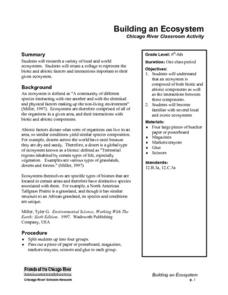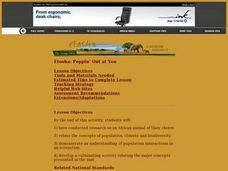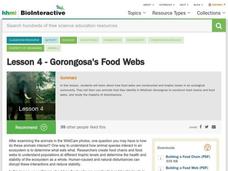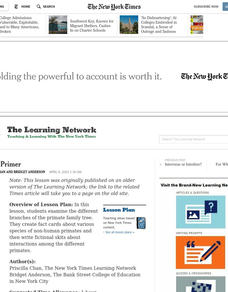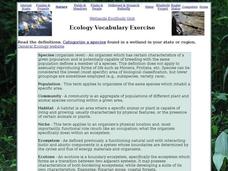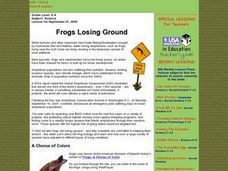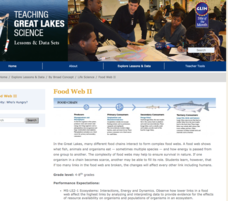Curated OER
Everything in Its Place: Science Classification
Students investigate the system of classification for living things through the sixteen lessons of this unit. The five kingdoms of monerans, protists, fungi, plants, and animals form the basis of several experiments as the similarities...
Curated OER
Evolution: Natural Selection
Pupils analyze and discuss the evolutionary history of dinosaurs. In this investigative lesson students monitor different organisms in the environment and analyze the pressures that affect the chances of survival.
Curated OER
Florida Panther Fun Facts
Learners study facts about Florida panthers. In this Florida panther lesson, students read a page of fun facts about the panther's life cycle, habitats, predators, and families. They complete three worksheets with information from the...
Curated OER
Building an Ecosystem
Middle schoolers research a variety of local and world ecosystems. Students will create a collage to represent the biotic and abiotic factors and interactions important to their given ecosystem.Middle schoolers will understand that an...
Curated OER
Etosha: Poppin' Out at You
Tenth graders research an African animal of their choice and relate the concepts of population, climate and biodiversity to their animal. They examine how population interacts in an ecosystem.
Curated OER
Understanding Interactions Among Local Species and the Local Environment
Students examine the differences between biotic and abiotic factors, explain the difference between habitat and niche and compare how organisms get their nutritional needs. In this local environment lesson students trace the path...
Curated OER
Interactions Among Living Things
Students role play predators and prey, classify organisms as predator or prey, and describe factors that affect population growth and size.
Montana State University
Everest Extremes: Biodiversity
How many animals can live in a climate as cold as Mount Everest's? Find out with a science lesson all about biodiversity. Activities include research, presentations, group work, coloring maps, and a simulation of a food web.
Channel Islands Film
Santa Cruz Island - Visible Thinking Routines
Visible Thinking Routines are designed to help learners deepen their understanding of what they are learning and enable them to communicate their understanding of concepts to others. Individuals adopt one of these routines to use to...
Howard Hughes Medical Institute
Lesson 4: Gorongosa's Food Webs
Who eats who in the savannas of Africa? Explore trophic levels with part four of an eight-part series of lessons focused around Gorongosa National Park. After young explorers identify animals using trailcam images, they construct a food...
Curated OER
Beautiful Bovine
Looking for a fun and interactive way to explore bovine biology? Learners read a brief informational text (included for printing) before participating in several cross-curricular activities. First, grab their attention with a hilarious...
Curated OER
Who Am I? the Web of Life ... With a Twist!
Students are assigned a secret species identity. They identify with the help of the other players. Once all identities have been deciphered, players form a circle and, by passing a ball of yarn from "species to species", they form...
Curated OER
Insect Monitoring
Middle schoolers participate in an interactive activity using the scientific method to study biodiversity. In this insect monitoring activity, students simulate the layers of soil and the insects that would live there. Middle...
Curated OER
Brays Bayou Spiderwort Genetic Study
Students formulate hypothesis based upon data gathered by examining possible crosses of spiderworts using Punnett squares. They present explanations for physiological adaptations of spiderworts that resulted from interactions within the...
Curated OER
Exploring the Natural World of the Balkan Peninsula
Young scholars explore the different habitats in the Balkan peninsula. For this ecology lesson, students research about a species and create a 3D diorama of its environment. They present project in class and share their research findings.
Curated OER
Biotic and Abiotic Factors
In this biotic and abiotic factors learning exercise, students complete 20 various types of questions related to biotic and abiotic factors. First, they write the vocabulary word that best completes the sentence. Then, students state an...
Curated OER
Primate Primer
Young scholars examine the different branches of the primate family tree. They create fact cards about various species of non-human primates and then write fictional skits about interactions among the different primates.
Curated OER
Communities and Biomes
For this communities worksheet, students will look at the interactions between biotic and abiotic factors and the effect these factors have on organism populations. Students will also order the succession steps that occur over time in an...
Curated OER
Ecology Vocabulary Exercise: Wetlands
In this ecology vocabulary exercise: wetlands instructional activity, students read the definitions of 8 words, then categorize a species found in a wetland in their region. This page has numerous links to helpful web resources.
Curated OER
Managing Wildlife
Students explore the relationship between wildlife and humans in northern New England. They also brainstorm ideas on why they think some species are greater in population than others in a given area.
Curated OER
Frogs Losing Ground
Students explore an exhibit through an interactive program on frogs. They can listen to the different sounds frogs make and the different types of frogs. They search for the types of frogs they find in their local area.
Curated OER
Reading Passage and Verb Tense
In this language arts interactive worksheet, 3rd graders read a passage about seabirds and answer questions. Students answer 25 interactive online questions.
Michigan Sea Grant
Food Web II
A food web consists of complex food chains and the more complex the web, the better likelihood of survival. Learners compare and contrast food webs and food chains and discuss concepts like the predator-prey and consumer-producer...
Curated OER
Lessons: Food Web
Students use an interactive web-based food web game to gain familiarity with tropic levels and interactions. They already understand that in an ecosystem there are four basic tropic levels: producers, primary consumers, secondary...



